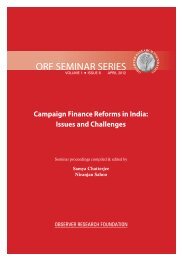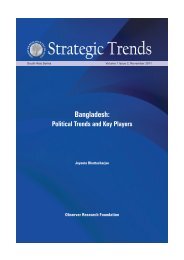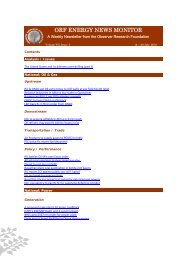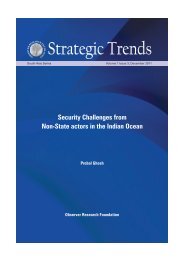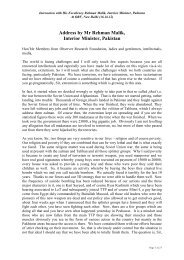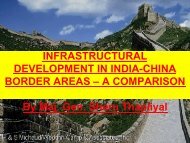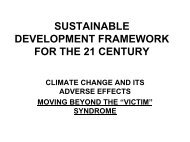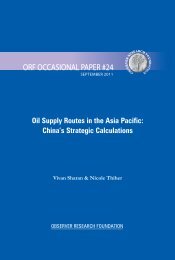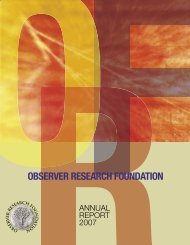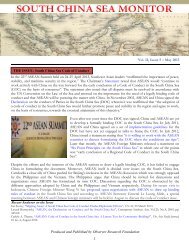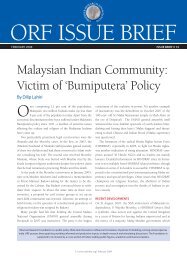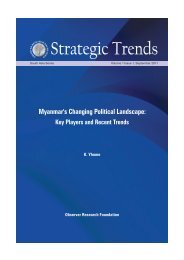MEKONG-GANGA DIALOGUE - Observer Research Foundation
MEKONG-GANGA DIALOGUE - Observer Research Foundation
MEKONG-GANGA DIALOGUE - Observer Research Foundation
Create successful ePaper yourself
Turn your PDF publications into a flip-book with our unique Google optimized e-Paper software.
<strong>MEKONG</strong>-<strong>GANGA</strong><br />
<strong>DIALOGUE</strong><br />
(Water, Food and Energy)<br />
7 th -9 th May, 2012<br />
<strong>DIALOGUE</strong> REPORT
ACKNOWLEDGEMENT<br />
The <strong>Observer</strong> <strong>Research</strong> <strong>Foundation</strong> gratefully acknowledges and thanks all the distinguished<br />
speakers, especially our esteemed guests from the Mekong Region, at the conference on<br />
‘Mekong-Ganga Dialogue: Water, Food and Energy”, May 7 th – 9th 2012, whose expert<br />
suggestions and recommendations have made this report possible. Our special thanks to Prof.<br />
S.R Hashim, Chairman, Indian Association of Social Science Institute, who graciously presided<br />
over the inaugural session and delivered the keynote address; and Dr. Kanokwan Manorom, Co-<br />
Chair M-POWER, our esteemed guest from Thailand for giving the keynote theme address.<br />
M-POWER appreciates the commitment and contribution of all Mekong delegation members<br />
who generously gave their time and experience to travel to India for this cooperation and<br />
engage fully with Ganga-interested colleagues. The Mekong delegation would also like to put on<br />
record their appreciation of the <strong>Observer</strong> <strong>Research</strong> <strong>Foundation</strong>’s extraordinary hospitality and<br />
arrangements, including meeting of the costs of Mekong delegates in New Delhi. Finally, the<br />
Mekong delegation would like to record their appreciation of the CGIAR Challenge Program on<br />
Water and Food in the Mekong, who financially enabled the trip, and provided very professional<br />
logistics support.<br />
DISCLAIMER<br />
The Contents published in this report are only informative in nature. <strong>Observer</strong> <strong>Research</strong><br />
<strong>Foundation</strong> and M-POWER may not be legally held responsible for any omissions or inaccurate<br />
information / mistakes here.<br />
The views expressed in this report may not be attributed to any individual contributors unless<br />
explicitly cited.<br />
20 Rouse Avenue, New Delhi – 110002 Ph 91.11.4350020 Fax 91.11.43520003 Email: sonali.mittra@orfonline.org<br />
www.orfonline.org<br />
1
TABLE OF CONTENTS<br />
1. INTRODUCTION<br />
1.1 Background ................................................................................................................... 3<br />
1.2 Objectives...................................................................................................................... 3<br />
1.3 Opening Ceremony ....................................................................................................... 5<br />
2. SUMMARY OF BREAK-OUT SESSIONS<br />
2.1 Energy Connections ..................................................................................................... 8<br />
2.2 Food Production, Policy and Practice .......................................................................... 9<br />
2.3 Groundwater Mining .................................................................................................. 11<br />
2.4 Flood Psychology......................................................................................................... 13<br />
2.5 Inter-Intra Regional Reportage ................................................................................... 15<br />
2.6 Cooperation Tracks .................................................................................................... 16<br />
3. CONCLUSIONS FROM THE PLENARY SESSIONS ............................................................... 19<br />
4. WAY FORWARD................................................................................................................ 21<br />
5. ANNEXES<br />
ANNEX I<br />
Welcome Address by Mr. Sunjoy Joshi, Director, <strong>Observer</strong> <strong>Research</strong><br />
<strong>Foundation</strong>…………………………………………………………………………………………………...... 24<br />
Theme Address by Dr. Kanokwan Manorom, Co-Chair, M-POWER ......................... 30<br />
Key note Address by Prof. S.R. Hashim, Chairman, IASSI ......................................... 33<br />
ANNEX II: List of Speakers and participants............................................................................ 40<br />
ANNEX III: Mekong-Ganga Dialogue - Program Details .......................................................... 43<br />
20 Rouse Avenue, New Delhi – 110002 Ph 91.11.4350020 Fax 91.11.43520003 Email: sonali.mittra@orfonline.org<br />
www.orfonline.org<br />
2
1. INTRODUCTION<br />
1.1 BACKGROUND<br />
Mekong-Ganga Dialogue (MGD) is an international cooperation forum for<br />
enhancing understanding between Mekong and Ganga countries about water,<br />
food and energy challenges. MDG organized its first official opening conference<br />
in New Delhi, India on 7 th – 9 th May, 2012 through the collaborative efforts of a<br />
Delhi based think-tank, <strong>Observer</strong> <strong>Research</strong> <strong>Foundation</strong> (ORF) and the Mekong<br />
Program on Water, Environment and Resilience (M -POWER), a knowledge and<br />
governance network from the Mekong Region in East Asia.<br />
A team of over thirty experts drawn from varied fields such as economics,<br />
energy, ecology, social sciences, hydraulics and environmental sciences from<br />
the Mekong and Ganga regions participated in the forum. The program was<br />
designed to be open and interactive in nature to provide opportunity for<br />
deliberation on key issues related to water, food and energy.<br />
1.2 OBJECTIVES<br />
The Mekong-Ganga Dialogue aims to focus on a shared cross-learning between<br />
communities of practitioners, policymakers and scholars focusing on<br />
transboundary and regional cooperation, and the water-food-energy nexus. It is<br />
not a Track-I or a Track-II initiative but both and more. Problems of water,<br />
energy and food facing these two vibrant regions are “wicked problems” where<br />
defining ‘what is the problem?’ is itself problematic. Wicked problems with<br />
water-food-energy involve a plethora of stakeholders holding contradictory<br />
20 Rouse Avenue, New Delhi – 110002 Ph 91.11.4350020 Fax 91.11.43520003 Email: sonali.mittra@orfonline.org<br />
www.orfonline.org<br />
3
certitudes as well as conflicting value systems that define problems in different<br />
ways, interlace through multiple layers of society, and require constructive<br />
engagement among themselves to discover new (and perhaps uncomfortable)<br />
‘knowledges’, that might lead to new solutions to past impasse. As such, this<br />
MGD is intended to be the start of a sustained conversation between varied<br />
stakeholders of the two regions that would enable mutual learning.<br />
The broad purpose of this first meeting of the MGD was to bring together<br />
scholars, practitioners, policy makers and others from the Mekong and Ganga<br />
regions to share their experiences and to explore areas of fruitful mutual<br />
collaboration.<br />
OBJECTIVES<br />
<br />
To create a platform for sharing experiences of successes and failures in order<br />
to evolve specific solution to common challenges.<br />
<br />
Identify key interdependent water, food and energy issues between the<br />
Mekong and Ganga regions with respect to their differences and similarities.<br />
<br />
Formulate a game plan for Mekong and Ganga colleagues to work together<br />
in addressing the water, food and energy challenges that promise the best<br />
mutual learning.<br />
20 Rouse Avenue, New Delhi – 110002 Ph 91.11.4350020 Fax 91.11.43520003 Email: sonali.mittra@orfonline.org<br />
www.orfonline.org<br />
4
1.3 OPENING CEREMONY<br />
Mr. Sunjoy Joshi, Director, ORF<br />
The opening session for the Mekong-Ganga Dialogue was attended by highly<br />
experienced and distinguished policy makers from India who diligently, with the<br />
Mekong guests, set the context for the forum. The welcome address was<br />
delivered by the Director of the <strong>Observer</strong> <strong>Research</strong> <strong>Foundation</strong>, Mr. Sunjoy Joshi.<br />
He highlighted that water, food and energy are going to circumscribe the<br />
common destiny of the world in this millennium. These among themselves would<br />
determine whether the 21st century would be more prone to instability and<br />
insecurity rather than social harmony; to violence rather than peace.<br />
Dr. Kanokwan Manorom, Co-Chair, M-Power<br />
Dr. Kanokwan Manorom, Dean, Faculty of Liberal Arts, Ubon Ratchatani<br />
University, Thailand and Co-Chair of M-POWER, in her keynote theme address,<br />
presented both the opportunities and complex challenges from the Mekong<br />
Region where globalisation and regionalisation are generating unprecedented<br />
20 Rouse Avenue, New Delhi – 110002 Ph 91.11.4350020 Fax 91.11.43520003 Email: sonali.mittra@orfonline.org<br />
www.orfonline.org<br />
5
flows of goods, investments, and people across the national boundaries of:<br />
Cambodia, China, Lao PDR, Myanmar, Thailand and Vietnam. Dr. Manorom<br />
observed that despite the differences between the countries of the region, there<br />
is widespread agreement of the need to look at problems jointly, learn what was<br />
not previously understood, and seek agreement on how best to handle<br />
important regional and Transboundary issues.<br />
institute<br />
Prof. S.R Hashim, Chairman, Indian Association of Social Sciences<br />
Prof. S.R Hashim, Chairman of the Indian Association of Social Science<br />
Institutions (IASSI) and former member & Secretary of the Planning Commission,<br />
in his keynote address, mentioned diverse yet significant challenges that India<br />
faces in water management, ranging from groundwater exploitation, water<br />
quantity and quality to water governance and planning. He elaborated on the<br />
different perceptions, bureaucracies and misappropriation of natural resources,<br />
which are detrimental to the development that India aspires to achieve.<br />
20 Rouse Avenue, New Delhi – 110002 Ph 91.11.4350020 Fax 91.11.43520003 Email: sonali.mittra@orfonline.org<br />
www.orfonline.org<br />
6
Roundtable Discussions<br />
Ramaswamy Iyer, Former Secretary,<br />
Water Resources Ministry, India<br />
A.K Bajaj, Vice-President,<br />
International Commission on<br />
Irrigation and Drainage<br />
Plenary Session<br />
Chair of the Plenary Session<br />
(John Dore, Senior Water<br />
Resources Advisor, AusAID<br />
Samir Saran, Vice President,<br />
<strong>Observer</strong> <strong>Research</strong> <strong>Foundation</strong><br />
20 Rouse Avenue, New Delhi – 110002 Ph 91.11.4350020 Fax 91.11.43520003 Email: sonali.mittra@orfonline.org<br />
www.orfonline.org<br />
7
2. SUMMARY OF GROUP DISCUSSIONS<br />
An important objective of this Mekong-Ganga Dialogue workshop was to provide<br />
opportunities for peer-to-peer learning to improve the understanding of the sectoral<br />
challenges and to synthesize the lessons disseminated into the broader picture.<br />
Facilitated group discussions identified key concerns facing current and future<br />
development of water, food and energy and searched for creative and feasible<br />
suggestions for steps forward.<br />
2.1 ENERGY CONNECTIONS<br />
Energy connections focused on<br />
the physical inter-dependence of<br />
water and energy. Both energy<br />
and water are essential to every<br />
aspect of life: social equity<br />
ecosystem integrity and<br />
economic sustainability. While<br />
water is an absolute necessity<br />
for energy generation, whether it is nuclear, hydro, coal or oil, energy is essential<br />
for water too. Energy is used to extract, transfer and to treat drinking water. It is<br />
used in the collection, treatment and disposal of wastewater and for heating and<br />
cooling purposes by households and industries. In this context, key points to<br />
note from the session, include:<br />
20 Rouse Avenue, New Delhi – 110002 Ph 91.11.4350020 Fax 91.11.43520003 Email: sonali.mittra@orfonline.org<br />
www.orfonline.org<br />
8
The energy experts observed that water challenges are intimately connected<br />
to the quest for more energy, especially groundwater pumping. The demand<br />
for more energy is driving the demand for more water and vice-versa. It is<br />
not possible to address water and energy issues in isolation from each other.<br />
Critical issues of energy shortages, water unavailability, and production and<br />
management inefficiencies require amalgamation of water and energy<br />
priorities through integrated policy frameworks as well as political and social<br />
engagements.<br />
In line with the Mekong-Ganga future cooperative efforts, promotion of<br />
integrated energy markets was seen as one of the effective ways of<br />
improving energy efficiency in South Asia through re-invigorated existing<br />
forums within ASEAN and SAARC as well as new ones such as the MGD.<br />
2.2 FOOD PRODUCTION, POLICY AND PRACTICE<br />
The Mekong and Ganga regions have substantial small-holder agricultural<br />
systems with moderate contrast between policy, reality and practice. Since, the<br />
bureaucracies in Asia have not yet internalized the new integrated knowledge<br />
and understanding about river hydro-ecology, they tend to see rivers only as a<br />
means of irrigation and energy on one hand and on the other, disconnectedly<br />
perceive the food security agenda from a national security perspective without<br />
adequate consideration of other aspects. Therefore, there is a startling gap in<br />
food policies and implementation of sustainable practices for optimal utilization<br />
20 Rouse Avenue, New Delhi – 110002 Ph 91.11.4350020 Fax 91.11.43520003 Email: sonali.mittra@orfonline.org<br />
www.orfonline.org<br />
9
of the water resources. As a common point of reference for both the Mekong<br />
and Ganga, this small group discussed and identified this gap in order to produce<br />
tangible recommendations for the sector. Key points to note from the session<br />
include:<br />
<br />
<br />
Agricultural economists, policy makers and sociologists, present in the group,<br />
concluded that<br />
implementation<br />
of sustainable<br />
productivity<br />
enhancement<br />
technologies<br />
have become<br />
imperative to<br />
the sector’s holistic development. For instance, Systems of Rice<br />
Intensification (SRI), which increases productivity and conserves natural<br />
resources, has improved productivity and ecological integrity of the land in<br />
many parts of Cambodia. India has not been able to absorb this technology<br />
completely and therefore needs to encourage such practices to sustain its<br />
agricultural productivity before it irreversibly damages its productive lands.<br />
From the discussion on SRI and its process of implementation, it was<br />
revealed how technology socialization is critical. Absorption of new<br />
technological advancement requires flexible policy tools and mechanisms,<br />
enhanced engagement with the civil society and farmers. Agro-ecological<br />
20 Rouse Avenue, New Delhi – 110002 Ph 91.11.4350020 Fax 91.11.43520003 Email: sonali.mittra@orfonline.org<br />
www.orfonline.org<br />
10
innovations, from inception to practice require more effective public<br />
participation and strengthened institutional arrangements.<br />
<br />
Specifically, analyzing the Indian agricultural situation, it was felt that the<br />
‘food bowls’ need to shift from water scarce north-west (Punjab, Haryana<br />
belt) to water abundant north-east area. Growing water requirements,<br />
degrading soil qualities due to excessive exploitation and excessive<br />
dependence on north-west for food security, has logically directed the<br />
attention to consider the option of diversifying land for agriculture, favouring<br />
areas with natural water availability.<br />
2.3 GROUNDWATER MINING<br />
The debate between experts<br />
and decision-makers on the<br />
management of groundwater<br />
resources with respect to<br />
overexploitation of aquifers is<br />
based on the question of how<br />
to assess and regulate<br />
groundwater mining. The<br />
socio-economic dependence on groundwater resources requires explanation<br />
over a range of factors. Depletion of groundwater supplies due to irrigation is<br />
one of the major areas of concern in India, although not as much in the Mekong.<br />
This session shared the experiences of the Indian story of groundwater mining;<br />
20 Rouse Avenue, New Delhi – 110002 Ph 91.11.4350020 Fax 91.11.43520003 Email: sonali.mittra@orfonline.org<br />
www.orfonline.org<br />
11
more as a lesson to alert the Mekong Region colleagues to take precautionary<br />
measures. Key points to note from the session include:<br />
<br />
<br />
<br />
<br />
Some of the major challenges to India’s irrigation sector include: steady<br />
decline in the management and performance of all government and<br />
community managed groundwater irrigation systems and deterioration of<br />
quality and groundwater overdraft.<br />
Groundwater use in India largely increased because of its ‘democratic’<br />
nature, available to farmers who have access to a pump, further facilitated<br />
by power subsidies for agriculture. Accessibility led to wide spread<br />
exploitation of the resource leading to over-exploitation of the resource. As<br />
revealed, groundwater in India sustains 60% of the irrigated lands.<br />
Increasing the sustainability of groundwater-irrigated agriculture is intricately<br />
linked with the power and irrigation policies. For improvement in the<br />
groundwater balance, multi-dimensional and multi-scalar interventions are<br />
required by the government.<br />
Experts agreed that conjunctive management is required for integrated and<br />
joint administration of rainwater, surface water, wastewater and<br />
groundwater. Treating them in isolation would compromise on optimal<br />
socio-economic and environmental outcomes at the level of aquifer and<br />
irrigation system or a river basin.<br />
20 Rouse Avenue, New Delhi – 110002 Ph 91.11.4350020 Fax 91.11.43520003 Email: sonali.mittra@orfonline.org<br />
www.orfonline.org<br />
12
2.4 FLOOD PSYCHOLOGY<br />
The Mekong and Ganga regions are highly prone to floods. So far coping with<br />
floods has been through mitigation measures and risk-based flood management.<br />
Analysing the range of issues that plague the sector, this session aimed to<br />
investigate the perception of floods in terms of negative and positive<br />
consequences and the challenges surrounding the preparedness and<br />
management of floods. Key<br />
points to note from the session<br />
include:<br />
<br />
<br />
Historical perspectives on<br />
floods revealed that in<br />
ancient times, floods were<br />
regarded as the source of<br />
life-giving water and nutrients and welcomed. Flooding was considered good<br />
in an integrated relationship between nature and human activities, until<br />
modern engineering notions started dominating it with its uni-disciplinary<br />
ideologies.<br />
Given the context of monsoon-driven subtropical ecological systems for both<br />
Mekong and Ganga, experts felt that there is a requirement for looking at<br />
events like floods, droughts, groundwater recharge and extraction, not as<br />
disasters but as a normal phenomenon. There is a need for a mindset change<br />
because in the last century the dominant idea was that floods are disasters<br />
20 Rouse Avenue, New Delhi – 110002 Ph 91.11.4350020 Fax 91.11.43520003 Email: sonali.mittra@orfonline.org<br />
www.orfonline.org<br />
13
and hence the mitigation methods. Now, focus should be on treating flood<br />
management as part of adaptation strategies.<br />
<br />
<br />
How does data eventually flow from the bottom to the top and also laterally?<br />
There needs to be rapid means of communication through infrastructure<br />
development – contributing to data dissemination. Therefore, immediate<br />
actions can be taken in situation like flash floods.<br />
Democratization of data collection through community-based participation is<br />
imperative for strategic planning for flood management. Participatory data<br />
collection at the minimum watershed unit level that cuts across<br />
administrative, revenue and political boundaries seems to be fundamental in<br />
understanding the nature of the basin itself. This in effect can feed into some<br />
of the methods and technologies (GPS, mobiles etc.) that in turn can be used<br />
for this data collection. A plural multi-stakeholder forum needs to be in place<br />
to aggregate this method of data collection with the bottom-up approach.<br />
20 Rouse Avenue, New Delhi – 110002 Ph 91.11.4350020 Fax 91.11.43520003 Email: sonali.mittra@orfonline.org<br />
www.orfonline.org<br />
14
2.5 INTER-INTRA REGIONAL REPORTAGE<br />
Regional reportage on water and water-related developments offer insights into<br />
the way such issues are portrayed in the public domain. As much as it has the<br />
potential to dictate the direction of the debates, it can also propose to bridge<br />
the gap between civil society concerns and government initiatives by being<br />
responsible channels of communication. Over the past years, it has been<br />
observed that the sense of environmental and social awareness has gained pace<br />
with improved media reportage. This session delved into the possible role of the<br />
media in gauging the dynamics that surround the perceptions of water in society.<br />
Key points noted, include:<br />
<br />
<br />
There is no regular monitoring at any media level or through any<br />
organization for tracking the changes in water development in different<br />
regions. Also, transparency<br />
in data sharing is a critical<br />
issue in the Ganga region in<br />
contrast with Mekong,<br />
where data is more readily<br />
shared between and within<br />
countries.<br />
It is essential to galvanize communities to start bearing weight on the larger<br />
discourses around water. Pluralizing discussions around the media and<br />
20 Rouse Avenue, New Delhi – 110002 Ph 91.11.4350020 Fax 91.11.43520003 Email: sonali.mittra@orfonline.org<br />
www.orfonline.org<br />
15
educing the level of obsession with large media may be the right direction to<br />
influence inclusive decision-making processes.<br />
<br />
Mapping a trend line of attitudes towards water management is required to<br />
understand the socio-cultural temperature of the evolving societies and their<br />
changing concerns. Unless, that is identified and known, not much progress<br />
can be made towards sustainable water management.<br />
2.6 COOPERATION TRACKS<br />
Cooperation tracks in Asia have a mixed record of influencing either policy at the<br />
level of governments or at that of mass public opinion. On some issues, positions<br />
are polarized while there are issues not even on the discourse map. In the<br />
context of the Mekong-Ganga Dialogue, a question that needs to be addressed<br />
is: how can countries that share rivers (i.e. transboundary waters) come to a<br />
mutual understanding of their respective interests? The session set to explore<br />
the various definitions of ‘boundaries’ and its characteristic pronouncements<br />
implicating the future relationships and cooperation efforts. Key points<br />
discussed, included:<br />
<br />
The agreed idea of ‘boundaries’ is that it is not just physical or political or<br />
administrative but is a notion that incorporates all of the above. It also<br />
includes the idea that there are disciplinary boundaries (i.e. beyond the<br />
current over-emphasis on civil engineering and neo-liberal economics that<br />
20 Rouse Avenue, New Delhi – 110002 Ph 91.11.4350020 Fax 91.11.43520003 Email: sonali.mittra@orfonline.org<br />
www.orfonline.org<br />
16
cries for the need to treat water as a focal point, the intersection of multiple<br />
disciplines and not as the hegemony of a single subject by itself.<br />
<br />
<br />
<br />
Experts evaluated the lack of sociology, economics and legal disciplines at the<br />
national and international level of Transboundary issues. It was agreed that<br />
this wide range of disciplinary disjuncture needs to be removed.<br />
Water education was seen as an area of neglected focus. Water as seen by<br />
physics, chemistry, biology, history, geography, politics, sociology, poetry and<br />
religion needs to be understood to appreciate how society treats, uses,<br />
manages and values water. The way water is taught in elementary education<br />
determines a society’s attitude towards water and how it is taught in<br />
universities will determine how wide-visioned and sensitive our future<br />
‘water managers’ will become. If there has to be a shift in perception<br />
towards water, it has to be dealt with from where the education about water<br />
starts.<br />
It was observed that the preference of bilateralism over multilateralism<br />
arises specifically in India because of the nature of geography. In the SAARC<br />
region, India has boundaries with Nepal, Bangladesh, Pakistan and Bhutan;<br />
but these countries do not have boundaries with each other. India chooses to<br />
work with neighbours on many issues in bilateral forums, but is also slowly<br />
increasing its engagement in regional fora. Mekong countries also work<br />
together mainly in bilateral forums, but have begun to actively engage in<br />
evolving multilateral forums, including those on other shared international<br />
rivers – Irrawaddy, Salween, Mekong, Red. For example, there is a Mekong<br />
River Commission, represented in the Mekong delegation to this dialogue.<br />
These varied cooperative multilateral arrangements have encouraged<br />
20 Rouse Avenue, New Delhi – 110002 Ph 91.11.4350020 Fax 91.11.43520003 Email: sonali.mittra@orfonline.org<br />
www.orfonline.org<br />
17
productive, constructive engagements between officials, academics,<br />
businesses and social activists, enriching their understanding not only of<br />
water’s complexity but also each other’s sensitivities. Most notably, the<br />
Greater Mekong Subregion Cooperation, originally focused on economic<br />
c<br />
o<br />
o<br />
p<br />
e<br />
r<br />
a<br />
t<br />
i<br />
o<br />
n<br />
and facilitated by ADB, has now grown to a range of working groups and joint<br />
arrangements, with bi-annual meeting of six Prime Ministers. ASEAN and the<br />
larger East Asian Community also address many Mekong Region issues in<br />
multilateral forums.<br />
20 Rouse Avenue, New Delhi – 110002 Ph 91.11.4350020 Fax 91.11.43520003 Email: sonali.mittra@orfonline.org<br />
www.orfonline.org<br />
18
3. CONCLUSIONS FROM THE PLENARY SESSIONS<br />
The parallel session briefings were further deliberated upon to link it to the<br />
broader context of Mekong-Ganga collaboration. Key conclusions agreed upon<br />
are as follows:<br />
<br />
<br />
<br />
<br />
<br />
A shift in thinking around river-basin development and climate change issues<br />
from narrow national security concerns to a regional perspective that<br />
includes ecological and social concerns is imperative. Collaboration needs to<br />
be improved between regional scientists, policy makers, business groups and<br />
civil society on water governance and climate change issues.<br />
Incorporation of the voices of poor and marginalised communities into policy<br />
debates should be done through well-communicated media approaches.<br />
The future research agendas should also answer questions about what<br />
happens to the future food, farming and livelihoods in critical areas of the<br />
regions. The regional cooperation in these circumstances may be just one<br />
scenario among possible futures and would see how cooperation at the<br />
regional level delivers outcomes at the household level.<br />
Certain policies at the domestic level create distortions within the domestic<br />
markets – create difficulty to assess or compute the cost benefit analysis of<br />
Transboundary cooperation. It requires strong research to understand<br />
domestic situation at both ends, then work towards regional cooperation.<br />
Given that Mekong and Ganga countries have their own struggles within<br />
each country, international cooperation, at least could be a driving force to<br />
promote internal reforms in water management.<br />
20 Rouse Avenue, New Delhi – 110002 Ph 91.11.4350020 Fax 91.11.43520003 Email: sonali.mittra@orfonline.org<br />
www.orfonline.org<br />
19
More lessons need to be disseminated from the other parts of the world to<br />
understand the process of regional cooperation more deeply with subregional<br />
emphasis.<br />
Discussion efficiency needs to be improved to extract the best out of the<br />
debates and dialogues for concrete results, findings and learning.<br />
20 Rouse Avenue, New Delhi – 110002 Ph 91.11.4350020 Fax 91.11.43520003 Email: sonali.mittra@orfonline.org<br />
www.orfonline.org<br />
20
4. WAY FORWARD<br />
Participants from the Mekong and Ganga regions agreed upon the following<br />
suggestions, roles and responsibilities as a way forward for this dialogue:<br />
<br />
COORDINATING COMMITTEE FOR <strong>MEKONG</strong>-<strong>GANGA</strong> PROGRAM<br />
Our committee will work to promote:<br />
o<br />
o<br />
o<br />
o<br />
o<br />
o<br />
Joint studies for identifying gaps and opportunities for Mekong-Ganga<br />
collaboration in the domains of water, food and energy.<br />
Organisation of annual dialogues, events and conferences to increase the<br />
level of communication.<br />
Articulation of road maps in a time bound manner for future cooperation<br />
activities.<br />
Joint training for water management and allied sectors.<br />
Fellowships to promote cross-border learning among researchers,<br />
scholars and policymakers.<br />
Working groups that link organizations, and perhaps ‘pair’ individuals or<br />
small teams with similar interests.<br />
<br />
WORKING GROUPS:<br />
Our working groups will, for example:<br />
o<br />
Explore data and information sharing approaches and systems.<br />
20 Rouse Avenue, New Delhi – 110002 Ph 91.11.4350020 Fax 91.11.43520003 Email: sonali.mittra@orfonline.org<br />
www.orfonline.org<br />
21
o<br />
o<br />
o<br />
Produce policy analysis that crosses sectors (water, food, energy related)<br />
and crosses regions (contrasting and learning betwe en Mekong and<br />
Ganga).<br />
Improve the interface between science, practice, media and policy.<br />
To facilitate enriched Mekong-Ganga Dialogue in the years ahead, Ganga<br />
colleagues will explore establishing a perhaps similar multi-stakeholder<br />
‘G-POWER’ suitable to South Asian region’s specificities.<br />
<br />
ACTION TOPICS:<br />
Our topics for joint action might include, for example, examinations of:<br />
o<br />
o<br />
o<br />
o<br />
o<br />
o<br />
o<br />
Prospects for the 1997 UN Watercourse Convention being adopted in the<br />
Mekong and Ganga regions.<br />
Status of transmission grids and trading in Asia, and power sharing<br />
arrangements.<br />
Poverty and livehoods in critical areas of Mekong and Ganga.<br />
Progressive agricultural technologies – absorption and socialization.<br />
’Management’, or at least better understanding of the Asian water<br />
towers that, with the monsoon, supply the rivers of the Mekong and<br />
Ganga.<br />
Global virtual water flow and consequences for Mekong and Ganga.<br />
Political economy of hydropower in Mekong and Ganga.<br />
20 Rouse Avenue, New Delhi – 110002 Ph 91.11.4350020 Fax 91.11.43520003 Email: sonali.mittra@orfonline.org<br />
www.orfonline.org<br />
22
o Water scholars and concerned activists from the Mekong<br />
writing/speaking in the print and electronic media of the Ganga region<br />
and vice versa on a regular basis.<br />
o<br />
o<br />
Mapping the similarities and differences between policy, practice and<br />
culture between Mekong and Ganga countries.<br />
Other suggestions that arise and garner a constituency for constructive<br />
action!<br />
20 Rouse Avenue, New Delhi – 110002 Ph 91.11.4350020 Fax 91.11.43520003 Email: sonali.mittra@orfonline.org<br />
www.orfonline.org<br />
23
ANNEX I<br />
WELCOME ADDRESS<br />
SUNJOY JOSHI, DIRECTOR, ORBSERVER RESEARCH FOUNDATION<br />
Dear Dr Manorom, Co-Chair of M-Power, Dr Hashim Chairman IASSI, honoured<br />
delegates from the Mekong Countries, speakers from India and other countries and<br />
colleagues,<br />
It gives me great pleasure to welcome you all to this ORF-M-POWER exchange between<br />
experts of the Ganga and the Mekong to look at, in particular issues of Food, Water and<br />
Energy.<br />
Energy, water and food are inseparably tied to each other. The production of energy<br />
requires water, and access to water is in many ways controlled by access to energy.<br />
These three between them are going to circumscribe the common destiny of the world<br />
in this millennium. The answers to which questions will also determine whether we are<br />
going to move onward in a 21 st Century more prone to instability and insecurity rather<br />
than social harmony, to violence rather than peace.<br />
Together the Ganga and the Greater Mekong region are home to nearly one billion<br />
people whose fortunes are intricately bound with the destiny of this region. That<br />
represents one sixth of humanity. It presents perhaps the largest concentration of<br />
people without access to electricity and still dependent on biomass as the mainstay of<br />
20 Rouse Avenue, New Delhi – 110002 Ph 91.11.4350020 Fax 91.11.43520003 Email: sonali.mittra@orfonline.org<br />
www.orfonline.org<br />
24
its energy needs. It also hosts the largest number of people without access to safe<br />
drinking water or basic sanitation. Over seventy percent of available water in these<br />
countries is used in agriculture witnessing growing conflict between the production of<br />
crops for cash or food.<br />
The mainstream discourse so far has too often framed the debate in terms of three<br />
main issues. These have to invariably do with a) insufficient financial resources, b)<br />
inefficiencies in the utilization of these resources, and c) poor governance structures<br />
leading to inept management of resources.<br />
However, moving beyond this familiar debate, within the geographical space defined by<br />
these rivers, a population of 1 billion engages with the waters directly and indirectly; it<br />
does so every day in a million ways that have shaped not only their lives and livelihood,<br />
but their living cultures for centuries. Consequently, conversations around “managing”<br />
and “conserving” these majestic rivers cannot happen between Governments alone.<br />
They must incorporate the participation and involvement of these 1 billion hopes and<br />
aspirations.<br />
It is these enhanced and deeper conversations that are a necessity for all of us engaged<br />
in the policy debates within our domains of influence. The need is to link up the myriad<br />
independent conversations that are occurring in this region and create a community<br />
where learning and experience can be shared freely and honestly.<br />
Yes, Food, Water and Energy – or rather access to these, defines the level of<br />
development and security of any region and community. Yet, the macro narratives<br />
20 Rouse Avenue, New Delhi – 110002 Ph 91.11.4350020 Fax 91.11.43520003 Email: sonali.mittra@orfonline.org<br />
www.orfonline.org<br />
25
around these, confined to the level of governments and the strategic community, tend<br />
to often get framed by nationalist and other ideological perspectives.<br />
Viewed in these narrow confines, the debate around food, water and energy becomes<br />
securitized, transformed into a narrative that translates human needs into national<br />
security. This only makes it a zero sum game and the misery and vulnerability of the<br />
other becomes part of a policy calculus. The need therefore for a more reflexive debate<br />
on these matters.<br />
The need therefore to bridge the divide between the macro- and the micro –<br />
conversations – micro conversations that encompass the needs and aspirations of<br />
farmers and fishermen, labourers, women and plantation workers, the myriad micro<br />
narratives that remain muted that do not manage to find any weight among the larger<br />
policy discussions. It is this yawning gap that remains the greatest of all challenges as we<br />
seek a framework for equitable and efficient access to these principal human needs.<br />
Actually speaking, the two most bandied about phrases in the lexicon of development<br />
have in fact been "Participation” and “planning from below". Contrary to what most<br />
development theorists would have us believe, these two were not really discoveries<br />
made in the 1990s, but had rather been very much a part of the vocabulary of<br />
development since the euphoric days of community development and the ‘animation<br />
rurale’ programs which took birth in the British and French colonies. These were then<br />
carried over into the development ideologies of many of the newly independent nations<br />
of the region through the 40s and 50s.<br />
20 Rouse Avenue, New Delhi – 110002 Ph 91.11.4350020 Fax 91.11.43520003 Email: sonali.mittra@orfonline.org<br />
www.orfonline.org<br />
26
Thus the cooperative movement of yore was also conceived as a means of<br />
institutionalising the control of local populations over their own organizations.<br />
Yet 'participation', persistently and obstinately, has proved to be a most difficult and<br />
elusive goal to attain. Ultimately, if Community Development projects failed to affect<br />
the basic structural barriers to equity and growth in rural communities, it was exactly for<br />
the same reasons their successors failed too. The failure was directly related to their<br />
inability to affect or tackle the intricate contests for power reflected in rival attempts to<br />
problematize the issues involved.<br />
And I illustrate what I mean by referring to the mainframe discourses around natural<br />
phenomena such as droughts as well as floods – two occurrences that invariably and<br />
repeatedly force us to focus on the issues around water, energy and food. In all<br />
discussions on both drought as well as floods we see the articulation of two narratives<br />
each with its own set of contending truth claims. One posits them as a purely natural<br />
calamity, the failure or excesses of the monsoon, bringing in its wake suffering, disaster<br />
and starvation upon helpless subjects. It is posed as crises of food, work, fodder,<br />
drinking water, health calling for immediate measures and immediate solutions. This is<br />
the familiar calamity discourse of the here and now of instant schemes, instant solutions<br />
and instant gratification.<br />
The second is the familiar Malthusian narrative of human intervention having caused<br />
ecological disaster. The focus on calamity as a springboard for action is still there, but<br />
the need is now to restore the "balance" by careful planned interventions. This makes<br />
20 Rouse Avenue, New Delhi – 110002 Ph 91.11.4350020 Fax 91.11.43520003 Email: sonali.mittra@orfonline.org<br />
www.orfonline.org<br />
27
the victims are not so much as "helpless" as in many ways actually "responsible" for<br />
their plight.<br />
Politically, both sets of narratives are articulated by different actors or at different times<br />
to press forth differing truth claims. The first appears in self- congratulatory speeches as<br />
Governments commend themselves for the successful management of a crisis; or as<br />
local elites see opportunities to press forth with their favourite village schemes.<br />
The second makes itself felt in the deliberations at Copenhagen and Durban, the<br />
opposition's attacks on the government's "long term" plans to tackle drought; the<br />
Reports of Finance Commissions or the Recommendations of Special Task Forces; and<br />
finally, in demands for choosing between alternate schemes at the local level.<br />
Eventually, however, let us not forget that the causes as well as effects of vulnerability are<br />
never spatial, born out of the accident of geography or demographics. They are intensely<br />
economic, social and political being inalienably tied to the politics of access and control. It<br />
is this gap which needs to be bridged – the distance between Big Science and Traditional<br />
Knowledge, between technology and local know how, the difference between national<br />
priorities and community aspirations.<br />
The Mekong Ganga initiative hopes then to begin exploring these many strands to<br />
discover collaborative approaches that can help communities in the region to develop<br />
their own capabilities, and capacities. Share the stories and experiences of success and<br />
failures, to learn even more from each others’ failures, so that ideas and ideation<br />
happen across narrow state and national boundaries just as the rivers flow – in order to<br />
20 Rouse Avenue, New Delhi – 110002 Ph 91.11.4350020 Fax 91.11.43520003 Email: sonali.mittra@orfonline.org<br />
www.orfonline.org<br />
28
link up and discover ways to accommodate individual interests and the interests of<br />
communities with their common, their shared destiny.<br />
On this note, I declare the Mekong-Ganga Dialogue on water, food and energy duly<br />
open.<br />
Mekong-Ganga Delegation, New Delhi, 2012<br />
20 Rouse Avenue, New Delhi – 110002 Ph 91.11.4350020 Fax 91.11.43520003 Email: sonali.mittra@orfonline.org<br />
www.orfonline.org<br />
29
THEME ADDRESS<br />
DR. KANOKWAN MANOROM, CO-CHAIR, M-POWER<br />
Thank you very much Lydia, Sunjoy Joshi, Prof. Hasim, ladies and gentlemen, colleagues<br />
and friends,<br />
On behalf of our Mekong delegation, I say that we are delighted to be here and we look<br />
forward to meeting and working with your team. M-POWER is a network of people<br />
committed to high quality research and policy engagement between the six Mekong<br />
countries and with other parts of the world. The M-POWER vision is to realize an<br />
international standard of democracy in water related governance. Our mission is to<br />
support sustainable livelihoods and help the community and eco-systems in the Mekong<br />
region to conducting action research, facilitating dialogues, and nurturing transboundary<br />
knowledge networks that encourage diverse collaborative relationships and<br />
improve policy and practice.<br />
Hence, we were very pleased to receive this invitation from <strong>Observer</strong> <strong>Research</strong><br />
<strong>Foundation</strong> to assemble a Mekong delegation and to come here to beautiful New Delhi<br />
to take this first step in a new Mekong-Ganga Cooperation. This first step is about crosslearning<br />
between communities of practitioners, policy makers, and focusing on transboundary<br />
and regional cooperation and water-food-energy nexus. Our delegation<br />
includes men and women from all 6 countries (Vietnam, Myanmar, Cambodia, Laos,<br />
Thailand and China) very different, different organizations, some from government,<br />
some from outside government, some older, some younger, but all came to work for the<br />
20 Rouse Avenue, New Delhi – 110002 Ph 91.11.4350020 Fax 91.11.43520003 Email: sonali.mittra@orfonline.org<br />
www.orfonline.org<br />
30
improvement of our own country, but also our shared region. You will hear many times<br />
in the next few days we have a Mekong River and a Mekong Basin, but this is just a part<br />
of the wider Mekong region. We are six very different countries. We have different<br />
societies, landscapes and religions. The Mekong region is recognized for its diverse<br />
cultural richness.<br />
The Mekong region is rapidly changing. Globalization and regionalization are generating<br />
unprecedented flows of goods, investments, and people across the nation and<br />
boundary. Greater knowledge and appreciations of regions, socio, culture or diversities<br />
under the transformation view, contribute to mutual understanding, cooperation,<br />
sustainable development and prosperity. We also have vast differences within our own<br />
countries.<br />
On the signs and television advertising in Thailand we hear about “Incredible India” and<br />
are invited to “Come, seek and be discovered”. And to “match India's rhythms to our<br />
hearts, and colours to our minds...” We are told that Incredible India is friendly, warm,<br />
welcoming and unique.<br />
Well, we are here now, happily, so we will find out for ourselves!<br />
We will share with you our experiences in attempting to manage our many national and<br />
boundary water, food, energy challenges and water-related governance research and<br />
practice. We will share with you our methods of negotiation and policy making. Our<br />
delegates have different perspectives on water, food, energy challenges depending on<br />
where they are from and depending on their individual experiences. We work with<br />
many different partner organizations within and outside the Mekong region. We highly<br />
20 Rouse Avenue, New Delhi – 110002 Ph 91.11.4350020 Fax 91.11.43520003 Email: sonali.mittra@orfonline.org<br />
www.orfonline.org<br />
31
value networking and practical collaboration. Despite the differences between us in the<br />
Mekong region where we fully agree is that we need to look at problems to learn what<br />
we can and contribute to a decision in the most constructive ways possible. Our<br />
contribution to Mekong water-food-energy governance includes core research,<br />
convening or contributing to platforms and active fellowship program, exploration of<br />
new hydropower sustainability protocols, arranging of independent expert panels, and<br />
Mekong region’s future scenario-building.<br />
We are very pleased to have this opportunity to come to the famous <strong>Observer</strong> <strong>Research</strong><br />
<strong>Foundation</strong>, share with you and learn from you how you are dealing with challenges in<br />
your own place. Comparative perspectives and discussion on water, food and energy<br />
between Ganga and Mekong delegates will enhance our understandings about<br />
differences and commonalities about water-food-energy nexus. We will reflect on<br />
compare, contrast, diverse and context in the Ganga and Mekong. For us, we will focus<br />
on the Mekong, but please push us to be clear in our expression of our understanding.<br />
For us, we will focus on the Ganga and we will be proactive in our questioning and<br />
sharing by bridging environmental, social, culture, economic and political perspectives.<br />
We expect to discuss and share with our Ganga colleagues and identify area of mutual<br />
interests for future work.<br />
Thank you for the hospitality already extended and the efforts to get us to this point.<br />
We look forward to taking this first step together with you and a new Mekong-Ganga<br />
Cooperation.<br />
20 Rouse Avenue, New Delhi – 110002 Ph 91.11.4350020 Fax 91.11.43520003 Email: sonali.mittra@orfonline.org<br />
www.orfonline.org<br />
32
KEYNOTE ADDRESS<br />
PROF. S.R. HASHIM, CHAIRMAN, Indian Association of Social Sciences Institute<br />
Dear Dr. Manorom, Dr. Sunjoy Joshi, very distinguished participants from Mekong<br />
region and from India; it is a great pleasure for me to be associated with this event<br />
which has such an eminent gathering, airing some of my concerns on water, food and<br />
energy. I think this gathering or this dialogue between the two regions, the Ganga Basin<br />
and the Mekong Basin countries offers us a unique opportunity and advantage. We are<br />
dealing with two regions that have many common concerns, but at the same time do<br />
not have a common viewer to share. Therefore, this dialogue can proceed without<br />
passions of political hedging which underlie dialogues between those countries that also<br />
share a region and the concerns of course. A common concern arises from the particular<br />
conditions of these two countries; they are very populous regions with perhaps world’s<br />
highest density, have started developing fast in the last decade, still have a very large<br />
burden of poverty and concern with livelihood issues. Concerns about food security and<br />
water is at the base of both livelihood and food security for very-very large number of<br />
people in these two countries.<br />
In the modern world, the knowledge and the technology grows very freely as compared<br />
to what it used to be decades back. It is available to more countries and is freely<br />
exchanged. Therefore, on that front, I think there is not much of a problem yet. But<br />
issues arise in straightaway implementing that knowledge and those technologies in a<br />
particular situation. It is due to the particular conditions of the people, the way people<br />
are organized, and other urgent priorities e.g. the objectives of equity, social justice. The<br />
20 Rouse Avenue, New Delhi – 110002 Ph 91.11.4350020 Fax 91.11.43520003 Email: sonali.mittra@orfonline.org<br />
www.orfonline.org<br />
33
issues of political nuances, social organizations, and administrative problems are at the<br />
ground level and it is in these areas that we have to learn from each other a lot.<br />
I just made a distinction between the technology and methods of dealing with a<br />
problem. I deliberately put a secondary importance to those things, but the primary<br />
concern remains to be: how we manage our resources at the community and ground<br />
level? How the administrative systems are geared? How political problems are solved<br />
dealing with these issues? And it is here we can learn a lot and we can exchange.<br />
Food security is very important for India. We have a population which is already 1.22<br />
billions. In the decade between 2050 and 2060, the population will be at its maximum,<br />
more than 1.6 billion and then it may stabilize. Even with the current level of<br />
population, the food security becomes important even in the days of free trade because<br />
food is something for which even a relatively short deficiency, you cannot completely<br />
depend on trade. Last year’s food production in India, particularly measured in part of<br />
the food basket i.e. food grains which includes cereals and pulses, was about 240 million<br />
tons. Almost the whole of it is absorbed, indicating the level of consumption.<br />
Now, even if there is a 10% shortage of supply, means something like 25 million tons of<br />
food grains and food grains are only a part of the food basket, but very basic part in our<br />
situation. First of all, it is just not available at short notice. Secondly even at the<br />
indication of such shortages before you go to the market for shopping, the prices start<br />
touching the skies; prices shoot up making it almost impossible to procure.<br />
20 Rouse Avenue, New Delhi – 110002 Ph 91.11.4350020 Fax 91.11.43520003 Email: sonali.mittra@orfonline.org<br />
www.orfonline.org<br />
34
National security questions are related to food security questions. Shortage of food may<br />
even destabilize the growth. Therefore, there has always been a concern to produce<br />
almost the whole requirement of basic food i.e. the food grain and only trade at the<br />
margins.<br />
At present though we are in a relatively comfortable position as far as the food grain<br />
production and supplies are concerned in India, but there are certain weaknesses. One<br />
very important weakness is that almost the entire or very large part of this supply comes<br />
from north-western region of India i.e. Punjab, Haryana, and western UP. Historically, it<br />
is so because this was the area where infrastructure for agriculture was very well<br />
developed, there was canal system, irrigation system was very well developed and when<br />
we started our green revolution in mid 60’s, naturally this area came under focus. But<br />
today we have reached almost the peak of yield levels in food grains in this region with<br />
high level of fertilizer consumption, irrigation and intensive use of land, producing three<br />
crops per yr. Also, its ecological and environmental consequences are not very desirable<br />
results. The ground water is being excessively used and return flows from irrigation<br />
pollute even the ground water with chemicals, which is detrimental to the ecology of<br />
the region. Besides, the incomes of the farmers in this region are stagnating now.<br />
Punjab, which used to be no. 1 in per capita income in India a decade back, has slid<br />
down to almost 5 th position in per capita incomes in India. These are a few indications,<br />
so there is the situation that is not very sustainable. Therefore, we have to find solutions<br />
which conserve our situation, our water particularly and allow the north-western region<br />
to diversify away from food grains and yet keep India self-sufficient or at least food<br />
secured. This is the circumstance where the elements are sometimes contradictory;<br />
however, it is possible to meet all the rudiments of the situation as we will have to make<br />
20 Rouse Avenue, New Delhi – 110002 Ph 91.11.4350020 Fax 91.11.43520003 Email: sonali.mittra@orfonline.org<br />
www.orfonline.org<br />
35
a regional shift in the focus of production from north-west region to eastern region.<br />
Eastern region is also more water abundant region with more rainfall. But what is even<br />
more important perhaps for us, I think, is here that we have to exchange our views with<br />
other regions in the world and particularly the Mekong region.<br />
Overdependence on a basket of food is largely based on wheat and rice, a cereal and a<br />
few lentils and pulses, which needs to be broken. Discover other foods where you can<br />
beat the situation with less of water intensity, chemical intensity, pollution, and energy<br />
intensity. So at a more radical level it is not just how to put use a given set of crops, but<br />
to see how to manage our demand away from very water-intensive to less waterintensive<br />
cultivation and a more diversified eating habit. I should say it appears that we<br />
have a habit that cannot be changed because we have been eating rice for a very long<br />
time. In fact, India till 50’s was almost 90% rice-eating country. In the wake of food<br />
shortages in 50’s and 60’s when we have started importing PL-480 wheat, the habits<br />
slowly changed. Many people in the south and in the east thought that wheat could<br />
simply not be eaten; slowly the habits changed and now it almost cover the 40% of the<br />
food basket rather than just 10%, so habits have changed. In Gujarat, in western region<br />
of India, groundnut oil is the oil which is generally eaten and if you live there it appears<br />
that you just cannot live without groundnut oil. But groundnut was introduced in India<br />
only in 1930s. Before that it was just not known. In fact, the oil used in that region was<br />
the sesame oil, which is now not at all used. Habits changed over time and there is<br />
nothing sacrosanct with a particular given basket of food.<br />
Coming to the overall water situation in India, of course, for producing food and water<br />
at the base, just to give some very broad indicators we have about 4% of the world’s<br />
20 Rouse Avenue, New Delhi – 110002 Ph 91.11.4350020 Fax 91.11.43520003 Email: sonali.mittra@orfonline.org<br />
www.orfonline.org<br />
36
water resources in this country, but more than 17% of the population and this<br />
population still is growing at the ultimate speed. When we have maximum population,<br />
maybe we will have world’s 19% of the population around 2050 or so. Relatively<br />
speaking our water resources as compared to the rest of the world is scarce. When we<br />
talk of water resources really, we mean utilizable water resources, the water which can<br />
be used for agriculture, for drinking or other uses. Most of our renewable water<br />
resources we get through precipitation through monsoon which has spatial and<br />
temporal variability. One of the crucial problems of water resources in India has been<br />
and will remain how to store the maximum possible water from the precipitation. For<br />
that type of storage, the dams are very insignificant. Dams do not store a lot. I think the<br />
best storages are the underground aquifers. But how to see that excess water gets into<br />
the underground aquifers? This is one of the most important problems if we can solve in<br />
the long run or in the short run, we can go a long way in solving our water resources<br />
problem.<br />
There are many other concerns with our water resources. One of the most important<br />
concerns that nowadays bother us is climate change. Really do not know exactly what<br />
would be the consequences of climate change in details, but from all the studies which<br />
are available now it appears that one conclusion is definite that climate change is going<br />
to introduce lot of variability and uncertainty, even in the precipitation of rainfall.<br />
One of the other concerns, which is a very acute concern now, is the drinking water<br />
availability. We have all the water available, we have the ground water aquifers which<br />
are increasingly getting polluted, particularly in the rural areas and even in urban areas.<br />
Water supply systems have not been very efficient because of associated costs and its<br />
20 Rouse Avenue, New Delhi – 110002 Ph 91.11.4350020 Fax 91.11.43520003 Email: sonali.mittra@orfonline.org<br />
www.orfonline.org<br />
37
ecovery, distribution, subsidies and equity. So this is one area which requires our<br />
attention.<br />
How to enhance the availability of water? Enhancing the availability, there have been<br />
many ideas in this country and one of the grand ideas was interlinking of rivers. Of<br />
course, interlinking of basins at the margin has been possible; in fact it has been in<br />
practiced. Latest example is Narmada project which takes water from Narmada basin<br />
and part of it is put to Rajasthan, which belongs to another basin. So it is inter-basin<br />
transfer of water. There have been some small projects like this. But at a grand level,<br />
this type of a transfer perhaps is not very feasible. In fact, our largest water resources<br />
which flow to the sea are in the eastern region, Brahmaputra valley, and Brahmaputra<br />
water cannot be just simply transferred to this side because of the topography. It goes<br />
down and then again it starts arising towards the north-west. It would be very difficult<br />
and in fact it would involve an enormous amount of energy to transfer such waters, too<br />
much of energy that perhaps the value of water will not be worth it.<br />
Water use efficiency has been another important concern with us. The way we use our<br />
water has been very inefficient. In fact, more than 80% to 83% of the water that we<br />
have goes for irrigation and most of this water is carried through earthen canals which<br />
are unpaved and then through channels in the fields and a lot of water gets absorbed in<br />
the land, lot of water sieves through. In fact, the irrigation efficiency so far on an<br />
average is about 30% to 35%. You have brought the water to surface to the canals after<br />
spending a lot of energy ultimately and if you put it down under the ground then to<br />
extract it again you require a lot of energy. Underground aquifers should be charged<br />
with surplus water, when it is not being used but not with that valuable water which has<br />
20 Rouse Avenue, New Delhi – 110002 Ph 91.11.4350020 Fax 91.11.43520003 Email: sonali.mittra@orfonline.org<br />
www.orfonline.org<br />
38
een brought at a great cost for irrigation. In fact, if sufficient measures technically as<br />
well as administrative are taken, it is estimated that your water use efficiency can go<br />
above 50% and you can understand for 83% of the total water resources if the efficiency<br />
goes from 35% to 50%, you have almost 40% to 50% more water available just by<br />
improving the efficiency.<br />
This brings me to the other subject of energy. Hydropower comes with issues of<br />
investment, submergence, resettlement and rehabilitation, ecological and<br />
environmental impact. Yet hydropower is one of the most useful and cost-economizing<br />
source of energy.<br />
For other options, perhaps we can desalinate sea water, but that requires again very<br />
large amount of energy to meet energy demands. It has been used in the Middle East<br />
very widely now, Saudi Arab, even to some extent Israel. They are so far relatively<br />
energy-abundant countries and they are using desalinated water for drinking purposes;<br />
in a very limited way. We are using a lot of energy and if you add up perhaps it is very<br />
costly in terms of using that energy. So when we talk of water, we are really talking of<br />
energy and it is in this context I say that water use efficiency must be given prime<br />
importance because water use efficiency also means energy use efficiency. It is this<br />
energy-water nexus which I think must get our focus.<br />
Now with these few words, I think I would like to conclude. We will all look forward to<br />
deliberations in these two and half days’ dialogue and I hope lot of useful solutions will<br />
come out. Thank you very much.<br />
20 Rouse Avenue, New Delhi – 110002 Ph 91.11.4350020 Fax 91.11.43520003 Email: sonali.mittra@orfonline.org<br />
www.orfonline.org<br />
39
ANNEX II<br />
LIST OF PARTICIPANTS<br />
Indian Designation Organisation Email<br />
Delegates<br />
S. R. Hashim Chairman Indian Association of Social<br />
Science Institutions (IASSI)<br />
iassi79@yahoo.com<br />
Ramaswamy<br />
Iyer<br />
Former Secretary Water Resources Ministry ramaswamy.iyer@gmail.co<br />
m<br />
Sunjoy Joshi Director <strong>Observer</strong> <strong>Research</strong><br />
<strong>Foundation</strong><br />
Joydeep Director<br />
Internews Earth Journalism<br />
Gupta<br />
Network - The Third Pole<br />
Project<br />
A. K. Bajaj Vice President International Commission on<br />
Irrigation and Drainage (ICID)<br />
sunjoyjoshi@orfonline.org<br />
joydeepgupta@gmail.com<br />
akbajaj@gmail.com<br />
Manu<br />
Bhatnagar<br />
Principal Advisor-<br />
Environmental Project<br />
INTACH (Indian National Trust<br />
For Art And Cultural Heritage)<br />
manucentaur@hotmail.com<br />
A. K. Roy Chairperson Hazard Centre hazardscentre@gmail.com<br />
B. C. Barah Acting Director-NCAP Indian Agricultural<br />
barah48@yahoo.com<br />
<strong>Research</strong> Institute (Dept.<br />
NCAP)<br />
Prem S.<br />
Vashishtha<br />
Professor & Incharge R&D SHARDA UNIVERSITY premsv08@gmail.com<br />
Salman<br />
Haidar<br />
Amb. (Former Indian<br />
Foreign Secretary)<br />
Institute of Peace &<br />
Conflict Studies (IPCS)<br />
shaidar@airtelmail.in<br />
Samir Saran Vice President <strong>Observer</strong> <strong>Research</strong><br />
<strong>Foundation</strong><br />
Saurabh Program Advisor<br />
<strong>Observer</strong> <strong>Research</strong><br />
Johri<br />
<strong>Foundation</strong><br />
Clare Shakya Regional climate change<br />
DFID, India<br />
and water adviser for<br />
South Asia<br />
samirsaran@orfonline.org<br />
saurabhjohri@orfonline.org<br />
c-shakya@dfid.gov.uk<br />
20 Rouse Avenue, New Delhi – 110002 Ph 91.11.4350020 Fax 91.11.43520003 Email: sonali.mittra@orfonline.org<br />
www.orfonline.org<br />
40
Mekong Delegates Designation Organization Email<br />
Chanthana<br />
Wun'gaeo<br />
Professor<br />
Faculty of Political Sciences<br />
Chulalongkorn University, Thailand<br />
Chea Chou <strong>Research</strong>er Cambodia Development Resources<br />
Institute & M-POWER fellow, Cambodia<br />
Dipak Gyawali <strong>Research</strong> Nepal Water Conservation <strong>Foundation</strong><br />
Director Pragya (Academician) and M-POWER<br />
Steering Committee member,Nepal<br />
John Dore<br />
Kanokwan<br />
Manorom<br />
Senior Water<br />
Resources<br />
Advisor<br />
Dean<br />
Australian Agency for International<br />
Development (AusAID), Lao PDR<br />
Faculty of Liberal Arts, Ubon Ratchatani<br />
University, Co-Chair of M-POWER,<br />
Thailand<br />
Chantana.B@chula.ac.th<br />
chou@cdri.org.kh<br />
dipakgyawali@ntc.net.np<br />
johndore@loxinfo.co.th<br />
kmanorom11@gmail.com<br />
Khim Sophanna Chairman Irrigation Service Center (ISC), Cambodia khimsophanna@cedac.org.kh<br />
Kyan Dyne Aung<br />
Program<br />
Coordinator<br />
Economically Progressive Ecosystem<br />
Development (ECODEV), Myanmar<br />
kyandyneaung@gmail.com<br />
Lilao Bouapao Coordinator M-POWER, Lao PDR lilaolee@gmail.com<br />
Lu Zeng<br />
Mme Do Hong<br />
Phan<br />
Program<br />
Officer<br />
Chair of<br />
Council<br />
Australian Agency for International<br />
Development (AusAID), China<br />
Centre for Promotion of Integrated Water<br />
Resources Management, Vietnam<br />
lu.zeng@dfat.gov.au<br />
phan.dohong@gmail.com<br />
Piyaporn<br />
Wongruang<br />
Souphab<br />
Kongvichith<br />
Senior<br />
Journalist<br />
Dean<br />
Bangkok Post, Thailand<br />
Faculty of Environmental Studies,<br />
National University of Lao PDR<br />
piyapornw@Bangkokpost.co.th<br />
souphabk@gmail.com<br />
Te Navuth<br />
Secretary<br />
General<br />
Cambodia National Mekong Committee,<br />
Cambodia<br />
navuth@cnmc.gov.kh<br />
Tira Foran<br />
Wang Jianping<br />
Energy<br />
Analyst<br />
Associate<br />
Professor<br />
Commonwealth Scientific and Industrial<br />
<strong>Research</strong> Organisation (CSIRO), Australia<br />
School of Resource & Environment and<br />
Earth Sciences, Yunnan University, China<br />
tira.foran@csiro.au<br />
kmynwjp@yahoo.com.cn<br />
Xu Jianchu<br />
Senior<br />
Scientist<br />
World Agroforestry Centre (ICRAF), China<br />
and East Asia<br />
Zhang Jianping Director Institute for International<br />
Economic <strong>Research</strong>, National<br />
Development and Reform Commission,<br />
China<br />
J.C.Xu@cgiar.org<br />
jpzh88@gmail.com<br />
20 Rouse Avenue, New Delhi – 110002 Ph 91.11.4350020 Fax 91.11.43520003 Email: sonali.mittra@orfonline.org<br />
www.orfonline.org<br />
41
OTHER PARTICIPANTS<br />
Name Designation Organization Email<br />
Sarvjit Dudeja Consultant & Jawaharlal National University<br />
dudejasarvjit@yahoo.com<br />
Advisor on<br />
Science and<br />
Technology<br />
Arvind Kumar President India Water <strong>Foundation</strong> shweta.tyagi@indiawaterfound<br />
ation.org<br />
Karuna Kalra<br />
Senior<br />
AF-Mercados EMI<br />
karuna.kalra@afconsult.com<br />
Consultant<br />
Sanjay Gupta Communicatio<br />
ns Officer,<br />
South Asia<br />
Water<br />
Initiative<br />
World Bank<br />
sgupta6@worldbank.org<br />
P. K. Tiwari Chairman Ganga Devi Shakshik Society gdss_2003@yahoo.co.in<br />
Ashwini Goyal UNESCO Chronicle akgoyal18@yahoo.com<br />
G. N. Kathpalia Chairman Alternative Futures gnkathpalia@airtelmail.in<br />
Jan Axel Voss Counsellor,<br />
Environment<br />
and<br />
Climate<br />
Change<br />
C. K. Varshney Former Dean,<br />
Retired<br />
Professor<br />
Arvind Kaul<br />
Indian<br />
Administrative<br />
Service (Retd)<br />
Ramesh Kumar Jalan Resource<br />
Person &<br />
Moderator,<br />
Climate<br />
Change<br />
Community<br />
German Embassy<br />
School of Environmental<br />
Sciences, JNU<br />
Government of India<br />
United Nations Development<br />
Programme<br />
wi-21@newd.auswaertigesamt.de<br />
ckvarshney@mail.jnu.ac.in<br />
arvindkaul@hotmail.com<br />
ramesh.jalan@un.org.in<br />
20 Rouse Avenue, New Delhi – 110002 Ph 91.11.4350020 Fax 91.11.43520003 Email: sonali.mittra@orfonline.org<br />
www.orfonline.org<br />
42
ANNEX III<br />
PROGRAM<br />
<strong>MEKONG</strong>-<strong>GANGA</strong> <strong>DIALOGUE</strong><br />
<strong>Observer</strong> <strong>Research</strong> <strong>Foundation</strong> & M-POWER<br />
DAY 1: 7 th MAY, 2012<br />
TIME ACTIVITY SPEAKERS<br />
1100 -<br />
1200<br />
1200 -<br />
1330<br />
1330 -<br />
1430<br />
1430 -<br />
1600<br />
1600 -<br />
1620<br />
Welcome<br />
Remarks<br />
Keynote<br />
Address<br />
Inaugural<br />
Address<br />
Sunjoy Joshi,<br />
Director, <strong>Observer</strong> <strong>Research</strong> <strong>Foundation</strong><br />
Kanokwan Manorom<br />
Co-Chair, M-POWER<br />
S.R Hashim<br />
Chairman, IASSI & Former Member & Secretary -<br />
Planning Commission, Government of India<br />
G.K Chadha<br />
President , South Asian University & Former Vice-<br />
Chancellor, JNU<br />
SESSION 1: Context Setting; Acknowledging different perspectives<br />
Participant introductions, aspirations<br />
Joydeep Gupta<br />
Ganga context Director, Third Pole Project of Inter-news Earth<br />
Journalism Network and China Dialogue<br />
Mekong<br />
Context<br />
Mekong<br />
Context<br />
Lunch<br />
SESSION 1 - Continued<br />
Lilao Bouapao,<br />
Coordinator, M-POWER<br />
Xu Jianchu,<br />
International Centre for <strong>Research</strong> on Agroforestry, East<br />
Asia.<br />
Tea-Break<br />
20 Rouse Avenue, New Delhi – 110002 Ph 91.11.4350020 Fax 91.11.43520003 Email: sonali.mittra@orfonline.org<br />
www.orfonline.org<br />
43
1620 -<br />
1720<br />
Plenary:<br />
Comparing & Contrasting the constellation of drivers & contexts in the<br />
Ganga and Mekong<br />
1720 -<br />
1730<br />
Closing Remarks<br />
End of Day 1<br />
20 Rouse Avenue, New Delhi – 110002 Ph 91.11.4350020 Fax 91.11.43520003 Email: sonali.mittra@orfonline.org<br />
www.orfonline.org<br />
44
<strong>MEKONG</strong>-<strong>GANGA</strong> <strong>DIALOGUE</strong><br />
<strong>Observer</strong> <strong>Research</strong> <strong>Foundation</strong> & M-POWER<br />
DAY 2: 8 TH MAY, 2012<br />
TIME ACITIVITY SPEAKERS<br />
1000 -<br />
1030<br />
1030 –<br />
1200<br />
Reflections on<br />
Previous Day<br />
Chantana Wun'gaeo<br />
Faculty of Political Sciences,<br />
Chulalongkorn University, Thailand<br />
Girish Chadha<br />
Editor, US-Based OOSKAnews<br />
SESSION 2: ROUNTABLES<br />
SESSION 2.1: Energy Connections<br />
A.K Bajaj*<br />
Vice President, ICID & Former Chairman, CEA<br />
Facilitator<br />
Mohan Guruswamy,<br />
Distinguished Fellow, ORF<br />
Tira Foran<br />
Mekong<br />
Energy Analyst<br />
CSIRO Ecosystem Sciences<br />
Lydia Powell<br />
Ganga<br />
Head & Senior Fellow, <strong>Observer</strong> <strong>Research</strong><br />
<strong>Foundation</strong><br />
SESSION 2.2: Groundwater mining - taming the Anarchy?; Flood<br />
Psychology<br />
A.K Roy<br />
Facilitator<br />
Chairperson, Hazard Center, India<br />
Te Navuth<br />
Mekong<br />
Secretary General,<br />
Cambodia National Mekong Committee<br />
Manu Bhatnagar<br />
Ganga<br />
Principal advisor – Environmental Projects<br />
INTACH<br />
20 Rouse Avenue, New Delhi – 110002 Ph 91.11.4350020 Fax 91.11.43520003 Email: sonali.mittra@orfonline.org<br />
www.orfonline.org<br />
45
1200 -<br />
1300<br />
1300 -<br />
1400<br />
1400 -<br />
1530<br />
SESSION 2.3: Food Production, Policy & Practice<br />
B.C Barah<br />
Principal Scientist,<br />
Facilitator<br />
National Centre for Agricultural Economics and<br />
Policy <strong>Research</strong> (NCAP)<br />
Khim Sophanna,<br />
Mekong<br />
Chairman, Irrigation Service Centre,<br />
Cambodia<br />
Prem Vashishtha<br />
Prof. & Incharge, R&D,<br />
Sharda university<br />
Ganga<br />
Saurabh Johri<br />
Program Advisor, <strong>Observer</strong> <strong>Research</strong> <strong>Foundation</strong><br />
SESSION 2.4: Inter/Intra Regional Reportage; Cooperation Tracks<br />
Salman Haider<br />
Facilitator<br />
Former Foreign Secretary<br />
Piyaporn Wongruang<br />
Mekong<br />
Senior Journalist – Mekong Region<br />
Bangkok Post, Thailand<br />
Samir Saran<br />
Ganga<br />
Vice President & Senior Fellow, <strong>Observer</strong> <strong>Research</strong><br />
<strong>Foundation</strong><br />
Plenary Discussion -<br />
Recommendation All participants<br />
Draft 1<br />
Lunch<br />
SESSION 3: REGIONAL COOPERATION<br />
Dipak Gyawali<br />
Facilitator<br />
M-POWER<br />
Steering Committee<br />
Transboundary Issues<br />
&<br />
All Participants<br />
Cooperation Tracks<br />
Policies: Water-Energy-<br />
20 Rouse Avenue, New Delhi – 110002 Ph 91.11.4350020 Fax 91.11.43520003 Email: sonali.mittra@orfonline.org<br />
www.orfonline.org<br />
46
1530 -<br />
1600<br />
1600 -<br />
1700<br />
1700 -<br />
1730<br />
Food<br />
Key Water-Energy -<br />
Food topics<br />
Tea-Break<br />
All participants<br />
Closing remarks/ Recommendation Draft 2<br />
End of day 2<br />
20 Rouse Avenue, New Delhi – 110002 Ph 91.11.4350020 Fax 91.11.43520003 Email: sonali.mittra@orfonline.org<br />
www.orfonline.org<br />
47
<strong>MEKONG</strong>-<strong>GANGA</strong> <strong>DIALOGUE</strong><br />
<strong>Observer</strong> <strong>Research</strong> <strong>Foundation</strong> & M-POWER<br />
DAY 3: 9 TH MAY, 2012<br />
TIME ACTIVITY SPEAKERS<br />
SESSION 4: NEXT STEPS<br />
1000 -<br />
1030<br />
1030 -<br />
1200<br />
1200 -<br />
1300<br />
1300 -<br />
1320<br />
1320 -<br />
1330<br />
1330 -<br />
1430<br />
Reflections on Previous<br />
Day<br />
Facilitator<br />
Mekong-Ganga Dialogue:<br />
Sharing Ideas for Next<br />
Step<br />
Mekong-Ganga: Agreeing<br />
Future Cooperation<br />
Final Reflections<br />
Lydia Powell<br />
Head, Senior Fellow, <strong>Observer</strong> <strong>Research</strong><br />
<strong>Foundation</strong><br />
Clare Shakya<br />
Senior Regional Climate Change and Water<br />
Adviser<br />
DFID India<br />
All Participants<br />
Closing Ceremony<br />
Lunch<br />
End of Day 3<br />
20 Rouse Avenue, New Delhi – 110002 Ph 91.11.4350020 Fax 91.11.43520003 Email: sonali.mittra@orfonline.org<br />
www.orfonline.org<br />
48



